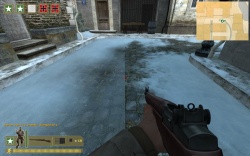WorldVertexTransition
(Redirected from Blend texture)
Jump to navigation
Jump to search
This article or section needs to be updated to include current information regarding the subject.
Remember to check for any notes left by the tagger at this article's talk page.
Remember to check for any notes left by the tagger at this article's talk page.

Application without and with
$blendmodulatetexture.WorldVertexTransition is a Pixel shader available in all ![]() Source games. It is a shader functionally similar to LightmappedGeneric primarily used to perform a per-vertex linear blend between two textures on a displacement surface. Many of the parameter definitions for the secondary material are the same as the first material except with a "2" at the end. ex: $basetexture2
Source games. It is a shader functionally similar to LightmappedGeneric primarily used to perform a per-vertex linear blend between two textures on a displacement surface. Many of the parameter definitions for the secondary material are the same as the first material except with a "2" at the end. ex: $basetexture2
You can choose which texture you would like to appear on a vertex using Hammer's alpha painting tool. The blend is normally a linear gradient, but you can control the blend on a per-pixel basis by specifying $blendmodulatetexture in the material.
Caveats
Todo: This shader was significantly upgraded in  with new parameters, a new layer blending mode, drop shadows, and support for layer-specific detail textures and specular masks. Document these.
with new parameters, a new layer blending mode, drop shadows, and support for layer-specific detail textures and specular masks. Document these.
Example
WorldVertexTransition
{
$basetexture nature/dirtfloor006a
$surfaceprop dirt
$basetexture2 nature/rockfloor005a
$surfaceprop2 rock
%tooltexture nature/blendrockgrass004a_tooltexture
}
- Some visual effects can be selectively applied to one sub-material or the other. See the relevant articles for more details.
- The Hammer material browser won't be able to display a preview of the material unless it's given a
%tooltexture.
Supported Parameters
The first texture in the blend.
The second texture to blend to.
Modulate the blending between materials using a special texture.
Detail texturing. Applies the same detail texture to both materials. In  , each layer can use their own detail texture.
, each layer can use their own detail texture.
Specular reflections. In  , each layer can have their own specular mask.
, each layer can have their own specular mask.
Todo: Might disable
$blendmodulatetexture if both are used.Per-texel color modification via a warp texture. Applies the lightwarp to both materials.
Mitigation for displacement texture stretching.
Self-illumination. Applies the self-illumination to both materials.
Todo: Might disable
$blendmodulatetexture if both are used.Self-shadowing bumpmapping. If two bumpmaps are used, both must be self-shadowing bumpmaps in order for this to work properly.
Expensive and cheap transparency[Clarify]. Applies the transparency to both materials.
Causes the material to blend between the primary texture and full transparency. Automatically marks the material as $translucent. Requires
$vertexcolor to be set to 1.Adds the color of the pixels on the surface with the pixels of objects behind it.
SRGB tint layer 1.
SRGB tint layer 2.
[[%detailtype|%detailtype]] <string>
Specifies what Detail props to spawn on the material. The string should be the name of a detail type outlined in "detail.vbsp" or your specified .vbsp file.
 Note:On some materials, the sprites only show up on $basetexture, but not on $basetexture2. This may also happen when you make your own blend material using rocks and grass. If rock is $basetexture, only the rock will have grass sprites, which looks odd.
Note:On some materials, the sprites only show up on $basetexture, but not on $basetexture2. This may also happen when you make your own blend material using rocks and grass. If rock is $basetexture, only the rock will have grass sprites, which looks odd.
See also
- LightmappedGeneric, the standard shader for lightmapped surfaces.
- Lightmapped_4WayBlend, an upgraded displacement blend shader for
 .
. - LightmappedTwoTexture, a brush shader that multiplies a texture on top of another one.
- WorldTwoTextureBlend, a brush shader that applies a texture on top of another one using $detail.
- Displacement, the surface type this shader is used on.